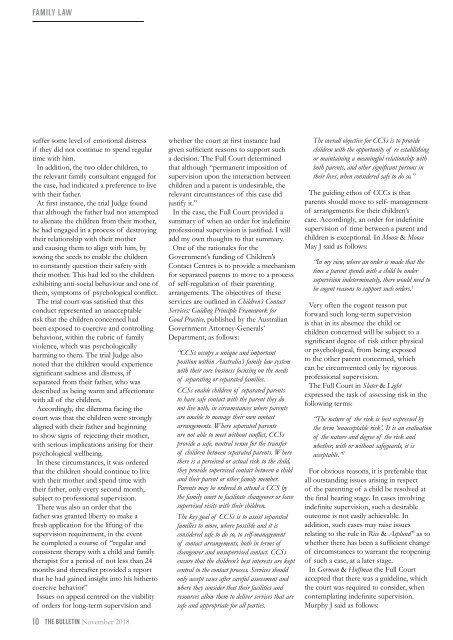LSB November 2018_Web
Create successful ePaper yourself
Turn your PDF publications into a flip-book with our unique Google optimized e-Paper software.
FAMILY LAW<br />
suffer some level of emotional distress<br />
if they did not continue to spend regular<br />
time with him.<br />
In addition, the two older children, to<br />
the relevant family consultant engaged for<br />
the case, had indicated a preference to live<br />
with their father.<br />
At first instance, the trial Judge found<br />
that although the father had not attempted<br />
to alienate the children from their mother,<br />
he had engaged in a process of destroying<br />
their relationship with their mother<br />
and causing them to align with him, by<br />
sowing the seeds to enable the children<br />
to constantly question their safety with<br />
their mother. This had led to the children<br />
exhibiting anti-social behaviour and one of<br />
them, symptoms of psychological conflict.<br />
The trial court was satisfied that this<br />
conduct represented an unacceptable<br />
risk that the children concerned had<br />
been exposed to coercive and controlling<br />
behaviour, within the rubric of family<br />
violence, which was psychologically<br />
harming to them. The trial Judge also<br />
noted that the children would experience<br />
significant sadness and distress, if<br />
separated from their father, who was<br />
described as being warm and affectionate<br />
with all of the children.<br />
Accordingly, the dilemma facing the<br />
court was that the children were strongly<br />
aligned with their father and beginning<br />
to show signs of rejecting their mother,<br />
with serious implications arising for their<br />
psychological wellbeing.<br />
In these circumstances, it was ordered<br />
that the children should continue to live<br />
with their mother and spend time with<br />
their father, only every second month,<br />
subject to professional supervision.<br />
There was also an order that the<br />
father was granted liberty to make a<br />
fresh application for the lifting of the<br />
supervision requirement, in the event<br />
he completed a course of “regular and<br />
consistent therapy with a child and family<br />
therapist for a period of not less than 24<br />
months and thereafter provided a report<br />
that he had gained insight into his hitherto<br />
coercive behavior”<br />
Issues on appeal centred on the viability<br />
of orders for long-term supervision and<br />
whether the court at first instance had<br />
given sufficient reasons to support such<br />
a decision. The Full Court determined<br />
that although “permanent imposition of<br />
supervision upon the interaction between<br />
children and a parent is undesirable, the<br />
relevant circumstances of this case did<br />
justify it.”<br />
In the case, the Full Court provided a<br />
summary of when an order for indefinite<br />
professional supervision is justified. I will<br />
add my own thoughts to that summary.<br />
One of the rationales for the<br />
Government’s funding of Children’s<br />
Contact Centres is to provide a mechanism<br />
for separated parents to move to a process<br />
of self-regulation of their parenting<br />
arrangements. The objectives of these<br />
services are outlined in Children’s Contact<br />
Services: Guiding Principle Framework for<br />
Good Practice, published by the Australian<br />
Government Attorney-Generals’<br />
Department, as follows:<br />
“CCSs occupy a unique and important<br />
position within Australia’s family law system<br />
with their core business focusing on the needs<br />
of separating or separated families.<br />
CCSs enable children of separated parents<br />
to have safe contact with the parent they do<br />
not live with, in circumstances where parents<br />
are unable to manage their own contact<br />
arrangements. Where separated parents<br />
are not able to meet without conflict, CCSs<br />
provide a safe, neutral venue for the transfer<br />
of children between separated parents. Where<br />
there is a perceived or actual risk to the child,<br />
they provide supervised contact between a child<br />
and their parent or other family member.<br />
Parents may be ordered to attend a CCS by<br />
the family court to facilitate changeover or have<br />
supervised visits with their children.<br />
The key goal of CCSs is to assist separated<br />
families to move, where possible and it is<br />
considered safe to do so, to self-management<br />
of contact arrangements, both in terms of<br />
changeover and unsupervised contact. CCSs<br />
ensure that the children’s best interests are kept<br />
central to the contact process. Services should<br />
only accept cases after careful assessment and<br />
where they consider that their facilities and<br />
resources allow them to deliver services that are<br />
safe and appropriate for all parties.<br />
The overall objective for CCSs is to provide<br />
children with the opportunity of re establishing<br />
or maintaining a meaningful relationship with<br />
both parents, and other significant persons in<br />
their lives, when considered safe to do so.”<br />
The guiding ethos of CCCs is that<br />
parents should move to self- management<br />
of arrangements for their children’s<br />
care. Accordingly, an order for indefinite<br />
supervision of time between a parent and<br />
children is exceptional. In Moose & Moose<br />
May J said as follows:<br />
“In my view, where an order is made that the<br />
time a parent spends with a child be under<br />
supervision indeterminately, there would need to<br />
be cogent reasons to support such orders. 1<br />
Very often the cogent reason put<br />
forward such long-term supervision<br />
is that in its absence the child or<br />
children concerned will be subject to a<br />
significant degree of risk either physical<br />
or psychological, from being exposed<br />
to the other parent concerned, which<br />
can be circumvented only by rigorous<br />
professional supervision.<br />
The Full Court in Slater & Light<br />
expressed the task of assessing risk in the<br />
following terms:<br />
“The nature of the risk is best expressed by<br />
the term ‘unacceptable risk’. It is an evaluation<br />
of the nature and degree of the risk and<br />
whether, with or without safeguards, it is<br />
acceptable.” 2<br />
For obvious reasons, it is preferable that<br />
all outstanding issues arising in respect<br />
of the parenting of a child be resolved at<br />
the final hearing stage. In cases involving<br />
indefinite supervision, such a desirable<br />
outcome is not easily achievable. In<br />
addition, such cases may raise issues<br />
relating to the rule in Rice & Asplund’ 3 as to<br />
whether there has been a sufficient change<br />
of circumstances to warrant the reopening<br />
of such a case, at a later stage.<br />
In Gorman & Huffman the Full Court<br />
accepted that there was a guideline, which<br />
the court was required to consider, when<br />
contemplating indefinite supervision.<br />
Murphy J said as follows:<br />
T<br />
10<br />
THE BULLETIN <strong>November</strong> <strong>2018</strong>


















